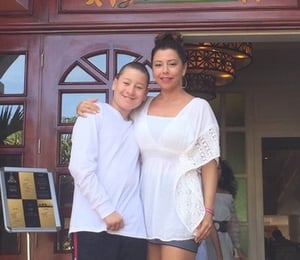 It’s not news to moms of children with PWS that ours is not an easy road. Our kids face medical problems, challenges in their schools, and often have behavioral issues that can be exhausting. Then there are the doctors’ appointments, therapies, social isolation and financial stress. Even compared to other developmental disabilities, PWS is at the top of the heap when it comes to maternal stress.
It’s not news to moms of children with PWS that ours is not an easy road. Our kids face medical problems, challenges in their schools, and often have behavioral issues that can be exhausting. Then there are the doctors’ appointments, therapies, social isolation and financial stress. Even compared to other developmental disabilities, PWS is at the top of the heap when it comes to maternal stress.
Dr. Elisabeth Dykens and colleagues at Vanderbilt University have a longstanding interest in understanding how stress from PWS and other developmental disorders affects families, and finding practical ways to alleviate family stress. In a recently published study [Shivers et al.] they examine what factors influence ‘life satisfaction’ in mothers of children with PWS. Life satisfaction is a measure of well-being, and refers to an individual’s satisfaction level, based on an overall appraisal of their life. Importantly, maternal life satisfaction plays a key role in overall family dynamics, and improving mom’s satisfaction can have far reaching benefits (happy mom, happy family…).
There are many aspects of PWS that put moms at risk for lower life satisfaction – previous studies suggest children with poorer physical health, requiring more supervision and having more behavior problems can lower life satisfaction. But, life satisfaction is complex and a number of factors may contribute - not only characteristics of the child and the disorder, but also characteristics associated with the mom. Understanding which of these factors has the biggest influence on mom’s life satisfaction is an important step in finding ways towards helping families better cope with the challenges of PWS.
This study looked at four main questions: What factors about PWS (severity, genetic subtype, etc) affect life satisfaction? What aspects of mom’s life (age, marital status, stress, coping style, etc.) influence life satisfaction? Does maternal life satisfaction change over time? and What factors affect life satisfaction over time? To address these questions, 196 moms of those with PWS (mom ages 24-85, “children”, age 4-52) answered questions about their life situation and their satisfaction in life. Many of the moms answered the questions at more than one time point, allowing the authors to look at change over time (side note: kudos to the Vanderbilt team for keeping up with these families over the years!)
Overall, the average life satisfaction rating was “slightly satisfied”, but there was a tremendous range of responses – from extremely dissatisfied to extremely satisfied (encouraging note: the number of “slightly” and “extremely” satisfied far outweighed “slightly” and “extremely” dissatisfied).
Interestingly, and perhaps somewhat surprisingly, several aspects of the child with PWS did not seem to impact mom’s life satisfaction, including the child’s age, IQ, weight (BMI), genetic subtype (UPD, deletion) or adaptive skills. Similarly, several important aspects of the mom’s situation did not make a significant difference in life satisfaction (including mom’s age, education level, marital status, or income). Also, while there was a lot of variability in reported life satisfaction over time (ups and downs), there no clear correlation between a particular assessment time and life satisfaction.
But, some things did have a measurable impact. With respect to features of PWS, the biggest impact was challenging behaviors. Not surprisingly, more severe behavioral issues and hyperphagia were associated with less satisfaction. Maternal factors were also important determinants of life satisfaction. Moms who reported high parenting stress – e.g., difficulty in the parent-child relationship, feeling like they're not handling things well - were less satisfied with life. Change in stress level was also the biggest factor influencing changes in satisfaction over time. In addition, maternal coping style proved to be very important. So, moms who dealt with the stress of PWS using an avoidant coping style (e.g., responding to a bad PWS day with a couple of glasses of wine and an online shopping spree) had a significantly lower life satisfaction than moms who used other approaches (sorry!!). Emotion-focused coping (e.g., venting to friends) was not strongly positively or negatively associated with life satisfaction. In contrast, rational/active coping (e.g., problem solving/"doing") was associated with a higher life satisfaction.
In summary, mothers of children with PWS face some unique challenges, and strategies to reduce stress and increase life satisfaction should take into account the specific challenges that PWS brings. Learning more effective coping strategies – focused on proactive problem solving to gain a sense of control - may have positive effects on mom, and by extension, the entire family. This understanding should help guide future studies aimed at improving overall family dynamics and outcomes in PWS.







